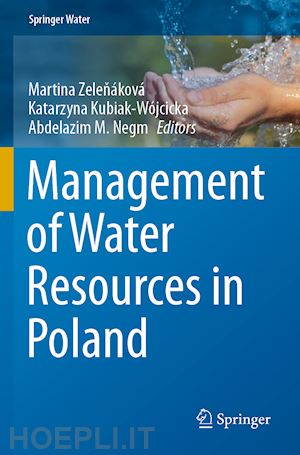
Questo prodotto usufruisce delle SPEDIZIONI GRATIS
selezionando l'opzione Corriere Veloce in fase di ordine.
Pagabile anche con Carta della cultura giovani e del merito, 18App Bonus Cultura e Carta del Docente
This book contains a rich resource of essential information on the water resources capacities in Poland. This book contributes to the recognition of water resources management including extreme hydrological events such as floods and droughts. The book incorporates case studies illustrating solutions of water quantity management in Poland. This edited book covers all water bodies in the country including rivers, lakes, reservoirs and groundwater.
The novelty of this book is that it represents the first time a manuscript covers the assessment of water resources in Poland, including variability, availability and economic use of the hydrological resources in the country with the lowest renewable resources of surface water per inhabitant in Europe.
Given the depth and breadth of its coverage, the book offers engineers, researchers, policy planners, decision makers, and stakeholders essential new insights into efficient water resources management.
Administration of Water Resources Management: Key Facts about Water Resources in Poland.- Water Resources in Poland Rivers.- Water Resources Of Polish Lakes.- Small Retention - Floodplain Lakes.- Groundwater in Poland.- Springs in Poland - Secure For the Future.- Flow Regimes Patterns and their Changes.- Runoff Seasonality in Two Big River In Poland (Vistula and Odra).- Flood Potential of Polish Rivers.- Low-Flows in Main Polish Rivers.- Hydrological Droughts in Poland.- Environmental Flows.- The Application of Hydrological Modeling.- Water Management in the Pomeranian Rivers Estuary Zone on the Background of Hydro-Meteorological Conditions.- Flood Risk Management System in Poland.- Exploitation of Rivers in Poland for the Purposes of Electricity Production.- Waterways In Poland – the History, Present State and Future.- The Effects of Plant Irrigation in Poland.- Open CoolingSystem of Power Plant in The Context of the Goal of the Water Framework Directive.- Conclusions And Recommendations.
Martina Zelenáková currently serves as an associate professor at the Institute of Environmental Engineering, Faculty of Civil Engineering at the Technical University of Košice. In the context of her scientific research activities she has focused on water management and environmental impact assessment. The results of her work have been published in books, journals, and conferences proceedings. She has engaged in variety of national and international projects.
Dr. Katarzyna Kubiak-Wójcicka is a hydrologist. Acquired the PhD degree in the area of Earth sciences, geography in 2006. She works at Nicolaus Copernicus University in Torun, Poland, at the Department of Hydrology and Water Management of the Faculty of Earth Sciences. She is the author of numerous papers on variability of river runoff with main object of interest being the Vistula river and its tributaries. Apart from scientific articles, she is experienced in hydrographic map editing and creating hydrological expert opinions for the purposes of civil courts and municipal governments.
Prof. Abdelazim Negm is a professor of Water Resources at the Faculty of Engineering, Zagazig University, Egypt, since 2004. He got his PhD in 1992 from Zagazig University (ZU) an his Msc from Ain shams University in the year 1990. He was the vice dean of the Faculty of Engineering of ZU from 12/2008 to 12/2011 and was the head of the Environmental Engineering Dept. at Egypt-Japan University of Science and Technology (E-JUST), Egypt 10/2013 to 9/2015. He participated in several international projects since 2006 until now. He published more than 300 papers in national and international journals and conferences. Some of his papers were awarded the prize of the best papers. He is the editor of several volumes of the Springer Handbook of Environmental Chemistry series (HEC series). Two volumes were published in May 2017 and one of them was within the top ten in water science for the year 2017. Also, ten volumes arepublished during the year 2018/2019.











Il sito utilizza cookie ed altri strumenti di tracciamento che raccolgono informazioni dal dispositivo dell’utente. Oltre ai cookie tecnici ed analitici aggregati, strettamente necessari per il funzionamento di questo sito web, previo consenso dell’utente possono essere installati cookie di profilazione e marketing e cookie dei social media. Cliccando su “Accetto tutti i cookie” saranno attivate tutte le categorie di cookie. Per accettare solo deterninate categorie di cookie, cliccare invece su “Impostazioni cookie”. Chiudendo il banner o continuando a navigare saranno installati solo cookie tecnici. Per maggiori dettagli, consultare la Cookie Policy.